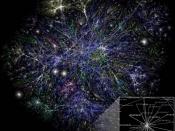Grenoble Graduate School of Business: Organizational Behavior AssignmentImpact of Information Technologies on LeadershipA short survey of E-LeadershipPatrick PetitFaculty Lecturer: Carmelo Mazza professor at Grenoble Graduate School of BusinessKey Words: Leadership, Executives, Information Technology, Organizational behavior, e-business, eleadership,Industrial Age, Information Age, Participation AgeNumber of Words not including references: 967IntroductionBusiness conduct in the workplace has been deeply transformed in less than a decade by theinformation technology revolution of the Internet and the World Wide Web. Organizations modeledon the industrial age paradigm of control and hierarchy have been replaced by a network ofdecentralized and agile functional groups, which can adapt their structure and direction fast enough toaccommodate the continuously changing needs of the e-business economy. This radical changesuggests that managers have been facing a serious discontinuity challenge in the way organizationsare managed today, which has resulted in the emergence of a new leadership style called the eleadershipor the virtual leader.
The goal of this short essay is to underline the motivation and main attributes of the e-leadership styleand describe how it has deeply affected the transformation process of the leaders of the e-businesseconomy.
E- leadership attributes and skills in the Participation AgePerhaps one of the most interesting aspects of organizational behavior and leadership power in theearly 21st century, revolves around the question of what kind of new leadership attributes and skillsare required in times of cataclysmic changes driven by the Internet revolution. The informationtechnology boost currently under way has introduced a new set of tools and communication schemeswhich have redefined people's interactions in the organization. For instance, the leader's role that wasbefore relatively clearly defined as a set of tasks to keep the organization running in a rigid and stableorganization structure, has now changed into managing an ecosystem of self-organized business unitsrunning decentralized or even externalized business processes. Forester Research calls these...


